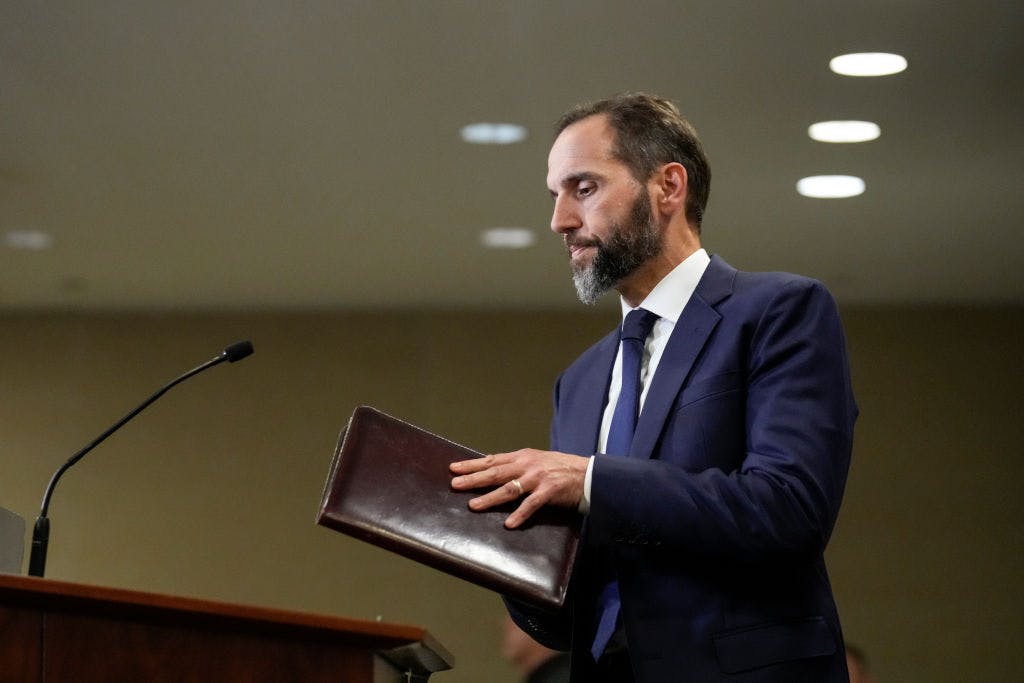Did Justice Barrett Just Give Jack Smith a Lifeline To Convict Trump? Will He Rewrite His Indictment To Seize It?
The Supreme Court appears likely to send the special counsel back to the drawing board, but the former president’s attorney makes a crucial concession during oral arguments.

The Supreme Court’s focus, during oral arguments over the January 6 prosecution of President Trump, on parsing the distinction between a president’s official acts and private conduct could spell trouble for Special Counsel Jack Smith’s case.
Yet one of the court’s most conservative members, Justice Amy Coney Barrett, surprised observers by providing the special counsel with a possible lifeline to save his prosecution from a judicial quagmire — if he takes it. She wonders whether he could “just proceed based on the private conduct and drop the official conduct?”
That distinction between public and private is not technically before the Nine, who will consider whether a former president possesses absolute immunity for official acts undertaken while in office. The lawyer for the Department of Justice, Michael Dreeben, tried to cajole the justices into rejecting Mr. Trump’s claim to immunity, arguing that it amounts to a license for presidential “bribery, treason, sedition, murder.”
The court’s conservative flank — and especially Justice Barrett — appeared less interested in reaching that question than in finding zones of agreement between Mr. Trump and his prosecutors. That observation of overlap, though, could mean delay for the special counsel, who has often invoked a “compelling interest” in a prompt prosecution.
So even as Justice Barrett offers Mr. Smith a lifeline, it may not be long enough for Mr. Smith to get his pre-election trial.
The next incarnation of Trump v. United States could have been previewed in an exchange between Justice Barrett and Mr. Trump’s attorney, John Sauer. She asked him, “So you concede that private acts don’t get immunity?” To which he responded, “We do.” The justice then marked Mr. Smith’s point that “there were sufficient private acts in the indictment for the trial to go — for the case to go back and the trial to begin immediately.”
Mr. Sauer’s admission that even his client’s expansive view of immunity would not cover private acts — and his allowance that three acts enumerated in Mr. Trump’s indictment are private — could amount to a glide path to trial for the special counsel. Justice Barrett seemed to invite such a trajectory, reminding Mr. Dreeben that the special counsel “has expressed some concern for speed and wanting to move forward.” Voilà — a way.
Mr. Dreeben, though, appeared to see that invitation as something of a poisoned chalice. He told the justice that “there’s really an integrated conspiracy here that had different components as alleged in the indictment,” meaning that the Department of Justice is loath to pursue a “skinnier” indictment than the one that is already docketed before Judge Tanya Chutkan at the Columbia District.
The advocate’s reluctance to immediately take up Justice Barrett’s suggestion, he explained, stems from Mr. Smith’s desire to present that “integrated picture to the jury so that it sees the sequence and the gravity of the conduct and why each step occurred.” The court, though, could rule that official acts are covered by immunity — as it did, in a civil context, in Nixon v. Fitzgerald.
If Mr. Smith declines Justice Barrett’s suggestion and pursues his “integrated” indictment, he could be in for months of litigation before he or his deputies ever lay eyes on a jury. That is because the Supreme Court could remand the case back to Judge Chutkan to parse out which actions in the indictment are official versus private before a jury is seated. The case could even come back up to the high court on those questions before a trial starts down below.
Mr. Sauer described this path as one where the “official stuff has to be expunged completely from the indictment before the case can go forward, and there has to be a determination at least on remand of what’s official — a two-stage determination of what’s official and what’s private.” If that is the course the Supreme Court directs, there is a distinct possibility that trial does not transpire until 2025.
If Mr. Smith limits himself to indisputably private acts, he could still charge the scheme Justice Barrett describes as the “plan to submit fraudulent slates of presidential electors to obstruct the certification proceeding.” That involved private attorneys like John Eastman and Sidney Powell, according to Mr. Smith’s allegations.
The special counsel, though, would not be able to simply allege, as he does now, that Mr. Trump used the justice department’s authority “to falsely present the fraudulent electors as a valid alternative to the legitimate electors.” Likely off-limits as well could be the accusation that Mr. Trump attempted to “enlist the Vice President to use his ceremonial role at the January 6 certification proceeding to fraudulently alter the election results.”
The possibility that the special counsel could have to slim down his indictment in order to get to trial could be why he seemed frantic to get to trial and initially urged the Supreme Court not to hear the case at this juncture, when Mr. Trump first asked the high court for relief. Now, he could be forced to prosecute on Justice Barrett’s terms, or not at all.
The Supreme Court could shrink Mr. Smith’s indictment even further if it rules, in another case, that criminal charges that originate in the Sarbanes-Oxley litigation are inapt for prosecutions in respect of election interference.
The special counsel has charged Mr. Trump with two such crimes. Mr. Smith claims that even a high court ruling that banishes those charges for other January 6 defendants would not affect his case. That, though, would likely have to be litigated, at length, possibly on appeal.

